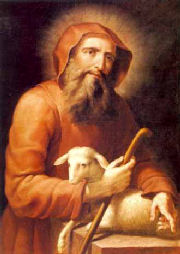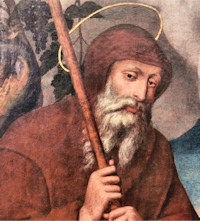Lent: April 2nd
Saturday of the Fourth Week of Lent; Optional Memorial of St. Francis of Paola, hermit
» Enjoy our Liturgical Seasons series of e-books!
Today’s Lenten Mass, similar to that of yesterday, shows how the plot to capture and kill Jesus grew in intensity. The persecuted prophet Jeremiah is today’s type or figure of the persecuted Lord Jesus. —The Vatican II Weekday Missal
St. Francis was born at Paola in Calabria; after living as a hermit for five years (from the age of fourteen to nineteen) he gathered around him some companions with whom he led the religious life. This was the origin of a new order, to which he gave the name of Minims, that is "the least" in the house of God. Pope Sixtus IV sent him to France to help Louis XI on his deathbed. He remained there and founded a house of his Minims at Tours.
This Saturday of the Fourth Week of Lent in the early ages of Christianity, was called Sitientes,, taken from the first word of the original Introit of the Mass meaning "Thirsting." The Church was addressing her catechumens in the words of Isaiah and invites them to thirst after the grace to come and receive it in the holy Sacrament of Baptism. This marked the last day of the Lenten season before entering into Passiontide. In the current Liturgical calendar the last day of Lent before Holy Week would be Saturday of the Fifth Week of Lent, but the beginning of the Paschal Triduum on Holy Thursday evening marks the official end of the Lenten season.
Meditation—The Need for Mortification Today
Lent is essentially a time of prayer and mortification. The body which has been indulged for so many months must now be denied. Even though fasting and abstinence are impossible for some of us, the penitential spirit may not be shirked. Modern creeds approximate more and more the pagan conception of man, and the penitential spirit is, of course, unbearable to those whose only philosophy of life is the song of the banqueter: "Let us eat, drink and be merry, for tomorrow we die."
Modern civilization scoffs at the notion of doing penance as if it were a vice of the pietist who wants to exalt one side of his nature at the expense of the other, although it is no small thing that the soul should be king of the body. Penance has a deeper significance than that, as I have pointed out. But, says the modern scoffer, "a man is no better and no worse than God made him. God who gave him impulses cannot be angry if he obeys them. Let a man snatch the passing pleasure."
In the Cathedral of Lubeck in Germany is a Lenten Monitory which may be taken as God's answer to such blasphemy:
Ye call Me Master, and obey Me not:
Ye call Me Light, and see Me not;
Ye call Me Way, and walk Me not;
Ye call Me Life, and desire Me not;
Ye call Me Wise, and follow Me not:
Ye call Me Fair, and love Me not;
Ye call Me Rich, and ask Me not:
Ye call Me Eternal, and seek Me not;
Ye call Me Gracious, and trust Me not;
Ye call Me Noble, and serve Me not;
Ye call Me God, and fear Me not;
If I condemn you—blame Me not. Amen
—Excerpted from Message of the Gospels
St. Francis of Paola
The figure of Francis of Paula seems incongruous against the background of fifteenth-century Italy. That was the time of the Italian Renaissance, the rebirth of learning and beauty, when men glorified human knowledge and scoffed at strict morality. Through the purity of his life, Francis reminded men once again that what is good and true and beautiful is a reflection of God.
Francis had been dedicated to God almost from the beginning of his life. He was born in the year 1416 in Paola, a small town in Calabria, Italy. While still an infant, he suffered from a swelling that threatened the sight of one of his eyes. His parents prayed to Saint Francis of Assisi to cure their son, promising that the boy would spend a year in a Franciscan monastery; the swelling immediately disappeared. At thirteen, Francis fulfilled his parents' vow and entered a nearby Franciscan monastery, where he was outstanding for his obedience to the monastic rule. A year later he made a pilgrimage to Rome and Assisi; then, returning home and deciding to become a hermit, he went to live in a secluded cave overlooking the sea. There for about six years, he slept on stone and ate only food that was given him or that he himself could gather in the woods. In 1435 he was joined by two other men who, with Francis, formed the nucleus of the future Order of Minims.
 For over forty years Francis wandered throughout southern and central Italy, gathering a large number of disciples, founding monasteries and churches. Wherever he went, he preached his own dynamic concept of charity, of living love through fasting and mortification. Penances, charity, and humility formed the basis of the Minims' life, and to the usual three vows taken by monks Francis added a fourth: perpetual abstinence from meat. At one time Church authorities attempted to make him retract this fourth rule, as too difficult for human nature to observe. In answer to this, Francis grasped some hot coals in his hands, holding them without pain or damage to himself, insisting that nothing is impossible to one who undertakes penances for the love of God.
For over forty years Francis wandered throughout southern and central Italy, gathering a large number of disciples, founding monasteries and churches. Wherever he went, he preached his own dynamic concept of charity, of living love through fasting and mortification. Penances, charity, and humility formed the basis of the Minims' life, and to the usual three vows taken by monks Francis added a fourth: perpetual abstinence from meat. At one time Church authorities attempted to make him retract this fourth rule, as too difficult for human nature to observe. In answer to this, Francis grasped some hot coals in his hands, holding them without pain or damage to himself, insisting that nothing is impossible to one who undertakes penances for the love of God.
Aside from the many miracles he performed, Francis was endowed with the gift of prophecy. He predicted the fall of Constantinople to the Turks, several years before the event took place. Although all Italy spoke of him as a wonder-worker, a prophet, and a saint, Francis' new order was not sanctioned by the Holy See until 1474. At that time the order was composed of uneducated men with only one priest. They were called the Hermits of Saint Francis of Assisi, but in 1492, at Francis' request, their name was changed to Minims; that is, the least in the household of God. Because of the strictness of their life, the Minims have always been one of the smallest orders in the Church.
In 1482, at the command of Pope Sixtus IV, Francis traveled to the castle at Plessis-les-Tours, France, where King Louis XI lay dying. Terrified by the thought of death, Louis had hoped that Francis might work a miracle to restore his health, but the saint would do nothing but assure him that the lives of all men were in the hands of God. Through Francis' prayers and counsel, Louis died peacefully. Louis' successor, Charles VIII, found Francis such an invaluable advisor and spiritual director that he erected a monastery for him at Plessis-les-Tours to keep him near the court. Charles' esteem for the saint was shared by Louis XII, who came to the throne in 1498, so Francis was never permitted to return to Italy.
Francis spent the last three months of his life in his cell preparing himself for death. He became grievously ill at the beginning of Holy Week in 1507 and died on Good Friday at three o'clock in the afternoon. He was canonized twelve years later, in 1519, by Pope Leo X. Most of Francis' relics were destroyed by the French Calvinists in 1562; the ones that remain are enshrined in various churches of the Order of Minims.
—The Lives of the Saints for every day of the year, Vol. 1: January-April
Patronage: against fire; against plague; against sterility; boatmen; fishermen; hermits; lifeguards
mariners; naval officers; sailors; travellers; watermen
See CatholicSaints.info for listings of geographic locations that claim St. Francis of Paola as patron.
Symbols and Representation: man with the word “charitas” levitated above a crowd; man holding a skull and scourge; man sailing on his cloak; green rose
Highlights and Things to Do:
- Learn more about St. Francis of Paola:
- Read this quote from St. Francis on the Vatican Website.
- See the statue of St. Francis at St. Peter's Basilica Colonnade






